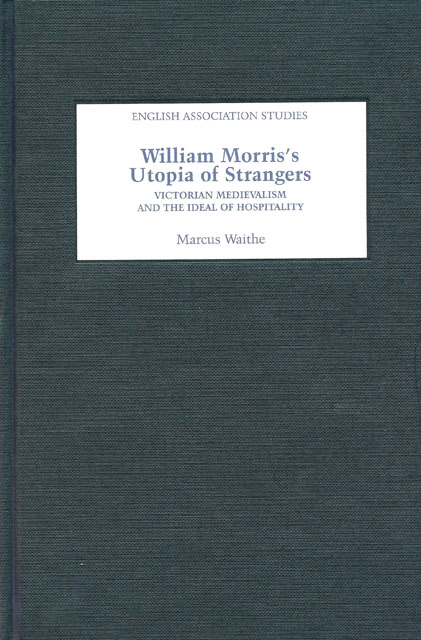Book contents
- Fronmatter
- Contents
- List of illustrations
- Acknowledgements
- Introduction
- 1 Wanderers Entertained: Idealized Hospitality in the Literature of Nineteenth-Century Medievalism
- 2 Before ‘the days when hospitality had to be bought and sold’: Idealized Hospitality and Aesthetic Separatism in Morris’s Work of the 1860s and 1870s
- 3 Entertaining the Past: Problems in Tourism, Translation and Preservation
- 4 Utopian Hospitality: The Teutonic ‘House Community’ and the Hammersmith Guest House
- 5 Legacies
- Conclusion
- Bibliography
- Index
4 - Utopian Hospitality: The Teutonic ‘House Community’ and the Hammersmith Guest House
Published online by Cambridge University Press: 18 March 2023
- Fronmatter
- Contents
- List of illustrations
- Acknowledgements
- Introduction
- 1 Wanderers Entertained: Idealized Hospitality in the Literature of Nineteenth-Century Medievalism
- 2 Before ‘the days when hospitality had to be bought and sold’: Idealized Hospitality and Aesthetic Separatism in Morris’s Work of the 1860s and 1870s
- 3 Entertaining the Past: Problems in Tourism, Translation and Preservation
- 4 Utopian Hospitality: The Teutonic ‘House Community’ and the Hammersmith Guest House
- 5 Legacies
- Conclusion
- Bibliography
- Index
Summary
Introduction
The previous chapter explored three comparatively abstract manifestations of Morris's confidence that strangers or receptacles of alterity might serve to redeem a host society. Attention now returns to the arena of the idyllic society and the formal utopia. To what extent did Morris use the medieval and Teutonic language of hospitality to represent the dilemma of the stranger in utopia? Considering the accustomed hostility shown by ideal societies towards outsiders, what advantages and what dangers might attend such an approach? The first section of this chapter explores these questions in the context of the Germanic societies portrayed by Morris in The House of the Wolfings and The Roots of the Mountains. The focus then shifts to the similarly contained community of the medieval guild. The final section addresses the difficult question of representing dissent within a formal utopia. News from Nowhere plays on the outlandish, yet familiar, appearance of the emissary entertained within its limits.What might the experiences of William Guest, and the machinery of reception through which he progresses, disclose about the role of hospitality in fashioning tolerance?
H. G.Wells's speculative novel, A Modern Utopia, contains a discussion with an obvious bearing on the notion of ‘utopian hospitality’. In order to ‘maintain itself intact from outward force’, the book's narrator asserts, the pre-Darwinian utopia was usually situated in ‘a mountain valley or [on] an island’. Indeed, the high value placed on isolation was reflected in a suspicion of strangers: the ‘Republic of Plato’, he notes, ‘stood armed ready for defensive war’, and ‘the New Atlantis and the Utopia of More […] like China and Japan […] held themselves isolated from intruders’. These statements serve to bolster the narrator's central proposition that ‘universal Toleration is certainly a modern idea’, that conditions in a modern utopia were bound to be quite different from those obtaining in earlier republics.
This conscious rejection of the vulnerable static society in favour of the fully transformed world is in some respects the transition Morris's prose writings undergo in the 1880s. The primitive communities discussed in the first part of this chapter are in many respects dissimilar from the jealous city-statesmentioned by Wells's narrator. Morris's formal utopia, in its defiant regionalism, has little in common with the ‘World-state’ proposed as an alternative.
- Type
- Chapter
- Information
- William Morris's Utopia of StrangersVictorian Medievalism and the Ideal of Hospitality, pp. 117 - 170Publisher: Boydell & BrewerPrint publication year: 2006



